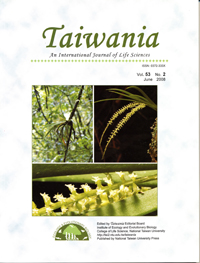Research Paper
Time Budget of Polyandrous Pheasant-Tailed Jacana (Hydrophasianus chirurgus) during Breeding Seaon in Taiwan
Te-Chih Chen, Yao-Sung Lin and Tzung-Su Ding
Published on: June 2008
Page: 107 - 115
DOI: 10.6165/tai.2008.53(2).107
Abstract
The mating system of the Pheasant-tailed Jacana (Hydrophasianus chirurgus) is classical polyandry. Many hypotheses have been proposed to explain the evolution of polyandry. The replacement clutches hypothesis indicates that it would benefit both sexes if females produce more clutches as replacement when clutch lost rate is high. Females should be freed from parental duty in order to accumulate more energy for producing more replacement clutches and males should carry all or most of parental responsibility. By observing daily time budget of both males and females, we tested whether the replacement clutches hypothesis applied to Pheasant-tail Jacanas in Taiwan. Our results indicated that foraging behavior was the major activity of females in breeding season. Females spent significantly more time on foraging behavior than males during both early and late breeding stages. In males, the breeding behaviors were the dominant activity. Females increased foraging time and reduced breeding time from early to late breeding stage. Males lowered their foraging time and spent more time on breeding behaviors at the late breeding stage. The results were consistent with the predictions of the replacement clutches hypothesis. The time spent on breeding behaviors (mostly incubating behavior) of male Pheasant-tailed Jacanas peaked around noon. We suggest this was due to the high air temperature of the study site during breeding season. Males had to stay in the nests to provide eggs and chicks protection from high temperature and ultraviolet ray.
中文摘要
雉尾水雉的繁殖配對系統是典型的一妻多夫制。在解釋一妻多夫制演化機制的許多假說中,補充窩卵假說認為,當鳥類的窩卵損失率相當高時,雌鳥生產一窩以上的補充窩卵,對雌鳥及雄鳥皆較有益。在此情況下,雌鳥不應花太多時間撫育雛鳥,而是應該盡量補充能量以產生更多的補充窩卵,撫育雛鳥的責任由雄鳥負擔。我們觀察雉尾水雉在臺灣的行為活動時間分配,並由此資料測試補充窩卵假說。研究所得結果,與補充窩卵假說的預測一致。雌鳥在繁殖季主要的行為是覓食,雄鳥主要的行為則是孵育雛鳥,雌鳥比雄鳥花費更多的時間覓食。從繁殖季早期至後期,雌鳥增加覓食的時間,雄鳥則是降低覓食的時間。雄鳥花在孵育雛鳥的時間在中午最高,這可能是因為研究地在繁殖季的氣溫相當高,雄鳥較需要留巢提供照護,以避免高溫與紫外線對巢卵及雛鳥的傷害。
Keyword: Pheasant-tailed Jacana, mating system, diurnal pattern, evolution, polyandry, parental care, reproductive strategy. 雉尾水雉、配對系統、日間變化、演化、一妻多夫制、親鳥照護、繁殖策略。


